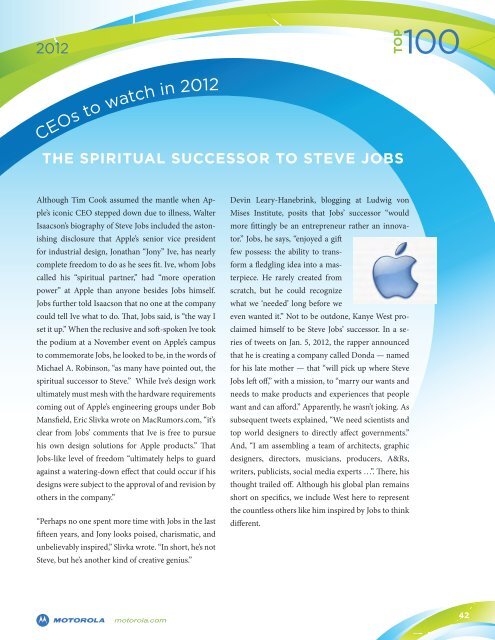2012 100 - Networld Media Group
2012 100 - Networld Media Group
2012 100 - Networld Media Group
You also want an ePaper? Increase the reach of your titles
YUMPU automatically turns print PDFs into web optimized ePapers that Google loves.
THE SPIRITUAL SUCCESSOR TO STEVE JOBS<br />
Although Tim Cook assumed the mantle when Ap-<br />
ple’s iconic CEO stepped down due to illness, Walter<br />
Isaacson’s biography of Steve Jobs included the astonishing<br />
disclosure that Apple’s senior vice president<br />
for industrial design, Jonathan “Jony” Ive, has nearly<br />
complete freedom to do as he sees fit. Ive, whom Jobs<br />
called his “spiritual partner,” had “more operation<br />
power” at Apple than anyone besides Jobs himself.<br />
Jobs further told Isaacson that no one at the company<br />
could tell Ive what to do. That, Jobs said, is “the way I<br />
set it up.” When the reclusive and soft-spoken Ive took<br />
the podium at a November event on Apple’s campus<br />
to commemorate Jobs, he looked to be, in the words of<br />
Michael A. Robinson, “as many have pointed out, the<br />
spiritual successor to Steve.” While Ive’s design work<br />
ultimately must mesh with the hardware requirements<br />
coming out of Apple’s engineering groups under Bob<br />
Mansfield, Eric Slivka wrote on MacRumors.com, “it’s<br />
clear from Jobs’ comments that Ive is free to pursue<br />
his own design solutions for Apple products.” That<br />
Jobs-like level of freedom “ultimately helps to guard<br />
against a watering-down effect that could occur if his<br />
designs were subject to the approval of and revision by<br />
others in the company.”<br />
“Perhaps no one spent more time with Jobs in the last<br />
fifteen years, and Jony looks poised, charismatic, and<br />
unbelievably inspired,” Slivka wrote. “In short, he’s not<br />
Steve, but he’s another kind of creative genius.”<br />
Devin Leary-Hanebrink, blogging at Ludwig von<br />
Mises Institute, posits that Jobs’ successor “would<br />
more fittingly be an entrepreneur rather an innovator.”<br />
Jobs, he says, “enjoyed a gift<br />
few possess: the ability to transform<br />
a fledgling idea into a masterpiece.<br />
He rarely created from<br />
scratch, but he could recognize<br />
what we ‘needed’ long before we<br />
even wanted it.” Not to be outdone, Kanye West proclaimed<br />
himself to be Steve Jobs’ successor. In a series<br />
of tweets on Jan. 5, <strong>2012</strong>, the rapper announced<br />
that he is creating a company called Donda — named<br />
for his late mother — that “will pick up where Steve<br />
Jobs left off,” with a mission, to “marry our wants and<br />
needs to make products and experiences that people<br />
want and can afford.” Apparently, he wasn’t joking. As<br />
subsequent tweets explained, “We need scientists and<br />
top world designers to directly affect governments.”<br />
And, “I am assembling a team of architects, graphic<br />
designers, directors, musicians, producers, A&Rs,<br />
writers, publicists, social media experts …”. There, his<br />
thought trailed off. Although his global plan remains<br />
short on specifics, we include West here to represent<br />
the countless others like him inspired by Jobs to think<br />
different.<br />
42



